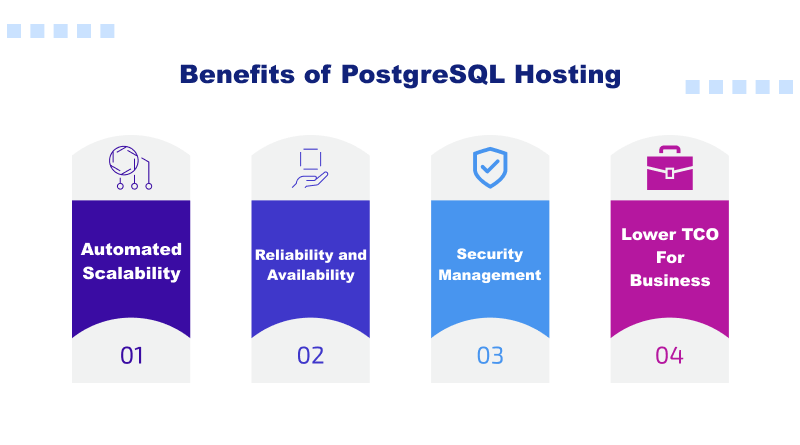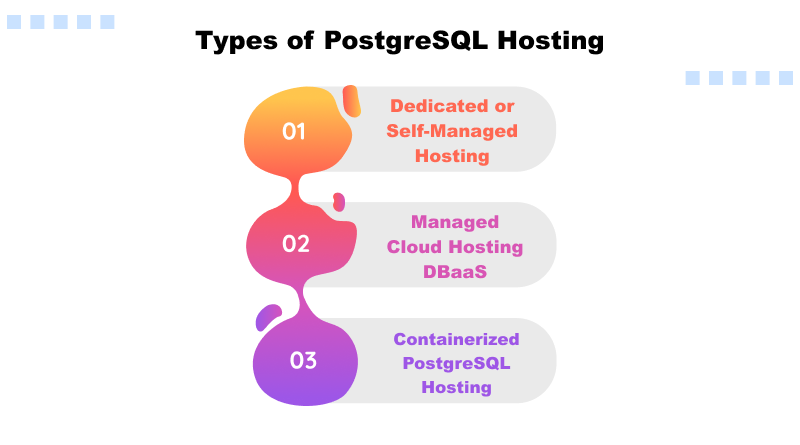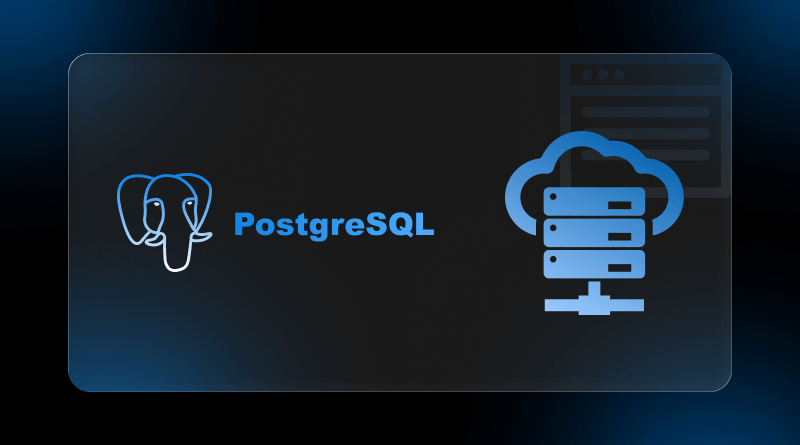PostgreSQL is one of the most powerful open-source databases available since it combines open-source agility with enterprise-level performance. PostgreSQL is also referred to as Postgres. PostgreSQL is also referred to as Postgres. The community of developers regularly maintains and updates PostgreSQL, ensuring its reliability. Stack Overflow developer community survey states that PostgreSQL is one of the most loved open-source databases.
However, the larger the business, the harder it is to properly manage Postgres. High availability, server configurations, and routine tasks such as backup, patching, and scaling require constant attention to detail, and most growing companies simply do not have the staff to manage Postgres. This is where PostgreSQL hosting steps in.
In this post, we will examine what PostgreSQL is used for, the primary advantages with regard to benefits and security offered with PostgreSQL hosting, and the different types of hosting and how to select the best option for your needs and perform a migration. PostgreSQL hosting is the ideal middle ground, offering raw performance for developers and unlimited scalability for businesses. It delivers sophisticated data governance capabilities that satisfy even the most demanding enterprise requirements.
Table Of Content
What is PostgreSQL Hosting?
In its most basic form, PostgreSQL hosting involves the complete or partial management of PostgreSQL database implementation, maintenance, and scaling on dedicated or cloud servers. This enables the developers and business owners to concentrate on the development of the application, while specialists manage the performance, security, and constant availability of the databases.
Today’s organizations regard database performance as just one slice of the overall problem: strategic use of resources. In-house PostgreSQL database infrastructure requires junior and senior DBAs to continuously monitor and maintain the system, along with incurring expensive capital expenditures. A managed PostgreSQL hosting solution offers the same infrastructure resources, ensuring automated scaling and fully managed data reliability and protection, all at a reduced cost.
What is PostgreSQL Used For?
In robust, enterprise-level PostgreSQL databases, PostgreSQL is recognized as one of the most powerful and flexible systems in the market, with enterprise-wide capabilities. Analyzing the use of PostgreSQL explains the significant trust it has garnered in organizations of all sizes and developers.
Pro Tip: MilesWeb is an example of a hosting provider that offers quality PostgreSQL hosting with great performance, specialized service, and excellent security. It is ideal for PostgreSQL hosting and scalable business growth.
Also Read: Managed vs. Unmanaged PostgreSQL Hosting
1. ACID Reliability Foundation
PostgreSQL is an Object-Relational Database Management System (ORDBMS)—a relational database with an object-oriented database (PostgreSQL). It is ACID compliant (Atomicity, Consistency, Isolation, Durability), which means every transaction is reliable, and even the system outages don’t compromise the reliability and integrity of data, which makes PostgreSQL ideal for applications that need high reliability and precision.
2. Extensibility: Complex and Modern Data
Flexibility is a primary reason why PostgreSQL is preferred over other databases. Unlike other databases, PostgreSQL can integrate Array, Hstore, and JSON/JSONB data types. This means that to a certain degree, the database is able to accommodate varying complexities of data as well as integrate multiple data types. This is very important for today’s applications that are built with evolving data structures and complex semi-structured data models.
3. Key Use Cases of PostgreSQL Hosting
- Medical & Health Systems
PostgreSQL’s unconventional compliance, integrity, and security features make it suitable for banking, accounting, and all other business systems for which data accuracy, integrity, and compliance are crucial.
- Geospatial Applications
PostGIS PostgreSQL enhances systems with high-performance spatial data capabilities and provides the ability to store data. This allows it to perform geospatial functions of storage, analysis, and location querying. This is valuable for mapping, geo-logistics, geo-routing, ride-sharing, and real estate applications.
- High-Volume Web and Mobile Applications
PostgreSQL is capable of managing high-volume, large-scale Web and mobile applications. Its value is most seen and largely recognized in e-commerce, social networking, and other large-scale and social SaaS products.
Benefits and Advantages of PostgreSQL Hosting
For businesses that optimize database and data performance beyond the basic drag-and-drop database management, PostgreSQL hosting is a strong performance solution. This is because, beyond just data storage, it provides advanced, scalable performance for secure operations with high reliability. This is why PostgreSQL hosting forms the digital infrastructure backbone.

Related Read: Learn to Create a PostgreSQL User
Automated Scalability
The capacity to scale PostgreSQL hosting services is one of the many benefits of your offerings of hosting services. PostgreSQL Better is a service automated to handle those geopolitical or seasonal traffic fluctuations without overspending to handle your computations or queries.
The automated handling capability ensures optimal performance without the need to perform frequent adjustments to the system. An automated system is a must for services like e-commerce or system analytics that handle huge volumes of data.
Reliability And Availability
For the PostgreSQL hosts, flexibility is a prerequisite. The absence of a flexible synchronous or asynchronous system and fail-over control would not be associated with the business of guaranteed 99.99 system availability. The users deeply trust the real-time system, financial SaaS applications and platforms that are critical to users’ business services of downtime.
Security Managementg
Security is yet another strong point with PostgreSQL hosting. Over the years, reputable PostgreSQL hosting service providers have made security a priority by implementing protective measures, including:
- Managed network isolation by the use of Virtual Private Clouds (VPCs), which keep intruders out.
- Automated threat remediation, including patching and closing gaps in security before they’re exploited.
- Encryption of data in transit and at rest, assuring sensitive data is never revealed in interception or breaches.
- Managed PostgreSQL environments are far more secure and protected environments than the original on-premise setups when considering the level of security.
The Business Advantage
Apart from the technical aspects and features of PostgreSQL hosting, the most valuable benefit is its ability to lower TCO (Total Cost of Ownership) by not having to support an in-house Database Administrator (DBA) team. Performance tuning, updates, and backups are service providers’ responsibilities, which allows internal staff to concentrate on initiatives other than database maintenance.
Types of PostgreSQL Hosting
When selecting a PostgreSQL hosting setup and configuration for your PostgreSQL database, you must evaluate the deployment options, as each one affects your control, ease of maintenance, and scalability. Below are different types of PostgreSQL hosting and how each one satisfies specific business requirements.

1. Dedicated or Self-Managed Hosting (Do-It-Yourself Approach)
Dedicated or self-managed PostgreSQL hosting is where the hosting provider allows you complete control over a physical or virtual server—typically a dedicated server or a VPS (Virtual Private Server). In this case, you are responsible for the installation, configuration, and ongoing maintenance of PostgreSQL.
It is highly beneficial to have complete independence over database environment, customized PostgreSQL, and fine-tuning performance. However, it also means maximum responsibility—you’ll handle software updates, backups, monitoring, and troubleshooting. Self-managed hosting provides a lot of independence and flexibility, but also requires a lot of technical knowledge and administrative work.
2. Managed Cloud Hosting DBaaS (Database-as-a-Service)
Today, the most popular and most efficient option is the Managed Cloud PostgreSQL Hosting. Also referred to as DBaaS (Database-as-a-Service). In this model, the service provider, whether it is AWS, Azure, Google Cloud, or a dedicated PostgreSQL host, takes care of infrastructure management. This includes:
- Provision of the Operating System (OS) of the computer and its subsequent updates.
- Monitoring for pertinent performance issues and applying automated updates.
- Performing automated backups and implementing a disaster recovery plan.
- You only manage your data, schemas, and your queries, and the provider takes care of uptime, security, performance, and elasticity.
This model is exceptionally efficient, minimizes the effort required for database management, and is perfect for enterprises and startups alike, especially those looking for fully managed solutions.
3. Containerized PostgreSQL Hosting
In modern development setups, hosting that utilizes containers via Docker or Kubernetes is becoming increasingly popular. Containers wrap PostgreSQL in a design that facilitates consistent environment replication in pods for development, staging, and production.
This model democratizes rapid deployment and is thus embraced by many, especially in the DevOps and microservices paradigms. This is, however, dependent on containerization and infrastructure management skills in monitoring orchestration, scaling, and persistent storage, which are vital for the sustainability of any microservices architecture.
PostgreSQL hosting is an example of the progress of cutting-edge database administration. It combines the flexibility and power of PostgreSQL with the convenience of fully managed services.
When teams focus on PostgreSQL hosting, they can avoid the configuration, patching, scaling, and maintenance of PostgreSQL and focus on the more value-adding efforts. The managed PostgreSQL hosting services ensure automated scaling, high availability, and robust data security, keeping apps seamless and dependable, even during peak usage.
There are strategic benefits for developers and businesses to use automation services for PostgreSQL hosting. Evaluate your current hosting configuration and consider automated services to fully optimize your databases and accelerate the development of your applications.
FAQs
1. What are the common types of PostgreSQL hosting?
PostgreSQL hosting types include self-managed (dedicated VPS), which affords you all the control; managed cloud, which provides you with hands-off, automated services (DBaaS); and containerized hosting, which is ideal for portable and consistent deployments across dev and production.
2. What are the advantages of cloud hosting for PostgreSQL?
Benefits of cloud hosting PostgreSQL include automated backups, high availability, global database access, scalable databases, and built-in monitoring services. The database system can be managed and monitored via remote access. These features are more reliable and require less management from the developer and the business.
3. How do I determine the best hosting provider for PostgreSQL?
Select a hosting provider based on their uptime guarantee, support, availability of security certifications, scalability of resources, and the clarity of their pricing. It is important for the provider to understand the specifics of PostgreSQL and provide appropriate management and tuning tools.
4. Can I take my existing PostgreSQL database and move it to a database hosting provider?
Yes, your database can be moved to a hosting provider. Most hosting providers and PostgreSQL cloud solutions provide tools like pg_dump and database replication, along with migration assistants, to help migrate your database with minimal downtime. These solutions are designed to maintain the integrity of your database during the migration.














